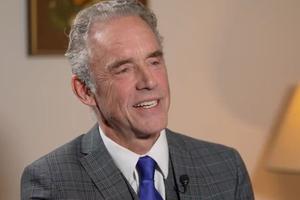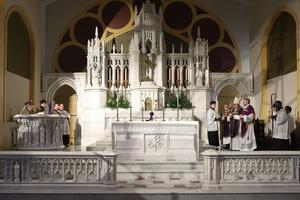Pascha in the Trenches — Easter in War-Torn Ukraine
For Christians in Ukraine, it has been a long Lent and a difficult Easter.

How does one experience joy in the midst of daily suffering, violence and tragic loss? How do we carry on the traditions of pysanky (Ukrainian Easter eggs), Pascha baskets and festive foods, with blood flowing through the streets of Mariupol, Kyiv and dozens of other cities in Ukraine?
This was the question on the minds and hearts of Ukrainian Catholics and Ukrainian Orthodox Christians as they celebrated Pascha (Easter) Sunday throughout war-torn Ukraine. Most of us will never have to consider Paschal joy in the midst of the worst kind of human suffering, but the Ukrainian people (and their Russian counterparts) have been forced to shout aloud “Christ is Risen”/“Christos Voskrese” (Old Church Slavonic) through tears and grief. So, how did the Church in Ukraine manage to celebrate the Feast of Feasts? We turn to the hierarchy of the Churches (both Catholic and Orthodox) in Ukraine to find the answers to this spiritual question.
Major Archbishop Sviatoslav Shevchuk
The Father and Head of the Ukrainian Greek-Catholic Church, His Beatitude Sviatoslav Shevchuk, released his Paschal Encyclical on Great and Holy Friday. Archbishop Sviatoslav has been giving daily updates on the war via the UGCC News website and via social media. Despite opportunities to flee Ukraine, he has remained in his cathedral in Kyiv and has been a great source of comfort and strength to his people. His words address the reality of the war in the light of the triumph of Christ. Here are some key excerpts from his Paschal encyclical:
For our people, in Ukraine and abroad, it would seem that the cross of our Lord was abruptly thrust upon our shoulders from the very beginning of Great Lent, and we have already been carrying it not for a day or two, a week or two, but continuously, day and night. For us, Holy Friday has become our daily bread, our everyday reality, and we do not know when the glorious day of victory over evil, hate, and violence will come. However, precisely today our Lord calls on us to have no doubt in the victory of light over darkness, life over death, truth over falsehood, and He assures us of His love and grace. From Him, our Risen Savior, we draw strength in the midst of our suffering today. He is the source of our hope. …
Our traditional icon of Christ’s Resurrection is the icon of the Descent into Hades. On it, we find depicted the dislodged doors of hell and the broken chains of sin. The Resurrection of Christ is a feast of victory — victory of life over death, of Divine truth over diabolical falsehood, of love over hate. One of our soldiers wrote on his helmet the following prayer: ‘God, if I am killed on the field of battle, take me into paradise, for I have already been in hell!’ In His resurrection, Christ emerges not only from the empty tomb but from the depths of hell and from deadly captivity for humankind. He emerges not alone, but by taking our forebears Adam and Eve by the hand, he leads all humanity out of the bonds of death. He takes the hand of our soldiers and volunteers, our civilian population, who have seen the hell of Russian occupation — he takes the hand of Ukraine and leads it to resurrection, filling it with the paschal joy of the victorious hymn, ‘Christ is risen!’ …
[He concludes] I embrace those who are in occupied territories, in areas of military engagement — those who do not have the possibility to prepare an Easter basket and who sing ‘Christ is risen!’ under the roar of cannons and exploding shells. In the hope of the resurrection, I cry and weep with all who lament their dead, from the ranks of the armed forces, and from the civilian population. May each of us today sense hope in a bright future in peace and harmony, for the Resurrection of Christ is the source of peace. May the rich symbolism of our traditional pysanka remind us that the Risen Lord is the source of heavenly gifts, of joy, goodness, victory, and eternal life.
In reading Archbishop Sviatoslav’s Paschal encyclical, one cannot but sense the real mix of emotions being experienced by the Ukrainian people. When the Church calendar says we ought to have joy in our hearts, it is the Cross that is the constant reality of war, not the Resurrection. The Resurrection becomes the symbol of hope and future glory — the light breaking through the darkness of war and death. Ukraine has been there before in her long history. This is not her first taste of suffering. She has grown used to the bitterness of war and oppression. For this reason, his letter is a strong reminder of the promised joy, comfort and freedom of the Paschal Banquet of the Lord.
Metropolitan Epiphanius
Amid the celebrations leading up to Holy Week in Ukraine, there were calls from the United Nations and from Metropolitan Onuphry (Ukrainian Orthodox Church, Moscow Patriarchate) for a cease-fire, so that Holy Week and Pascha could be celebrated in peace and that time could be used to establish humanitarian corridors. That call was rejected by the Kremlin and the bombing and strife continued throughout the holiest of weeks. Ukrainian President Zelenskyy questioned Russia’s commitment to Orthodox Christianity in her rejection of a cease-fire for Holy Week. An additional voice from Metropolitan Epiphanius of the Orthodox Church of Ukraine, lent further criticism, he stated:
Today, when we greet each other with the Lord’s Passover, with Easter, the enemy continues to shed the blood of the innocent on our earth. Despite the sanctity of Holy Week and the Resurrection of Christ for all Christians, Russian troops not only did not stop their crimes, but they, as if inspired by Satan himself, multiplied bloodshed. Throughout Lent, Russia, which considers itself a stronghold of true Christianity, has destroyed our cities and villages, killed innocent people, and destroyed everything it could. Isn’t this alone, aren’t all these poisonous, deadly fruits of the ‘Russian measure’ sufficient evidence that it is not God's blessing but the curse on the cause of Russia, its rulers, its troops, its inhabitants poisoned by lies?
Metropolitan Epiphanius continued on a hopeful note:
When the Savior was crucified and buried in the tomb, the hearts of the faithful were filled with suffering and pain, but the resurrection of Christ turned weeping into joy, drove away sorrow, and strengthened hope. So it was in ancient times, so it is today — by celebrating the Passover of Christ, glorifying the risen Lord, we receive spiritual strengthening in the midst of the sufferings and horrors of war with confidence in the victory of truth and goodness, in the victory of eternal life over hell.
The incompatibility of war with the Paschal message is clear. For Christian leaders in Ukraine, it has been a long Lent and a difficult Easter. However, Christ is Risen! He has risen in Ukraine too! For the suffering Ukrainian people, Pascha is different this year. The Lenten theme of “bright-sadness” continues into the Paschal season. One particularly striking divine grace exhibited by the above encyclicals is the theological virtue of hope. In Romans 8:22-25, St. Paul writes about Christian hope for future glory. He writes:
We know that the whole creation has been groaning in labor pains until now; and not only the creation, but we ourselves, who have the first fruits of the Spirit, groan inwardly while we wait for adoption, the redemption of our bodies. For in hope we were saved. Now hope that is seen is not hope. For who hopes for what is seen? But if we hope for what we do not see, we wait for it with patience.
Ukraine is groaning in labor pains. She groans patiently. Let us keep praying for peace in Ukraine. And, when the war is ended, collective humanity can shout in triumph at the realization of our hope — “Christ is Risen!”
- Keywords:
- easter
- ukrainian greek catholic church
- eastern orthodoxy
- archbishop sviatoslav shevchuk
- ukraine war

















